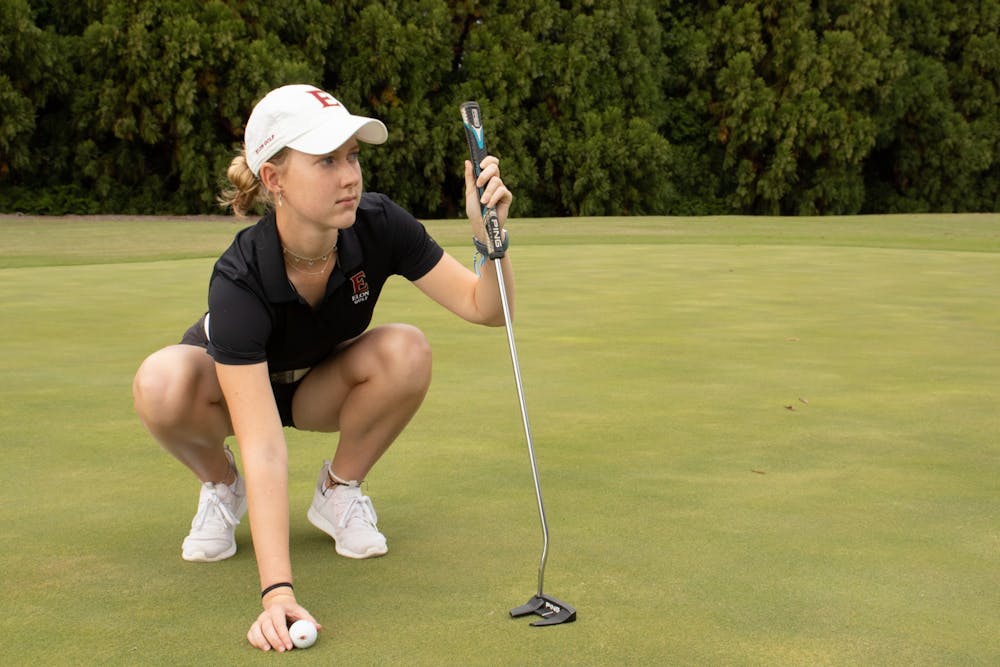The sun is still rising when sophomore Lotte Fox prepares for golf practice. Stepping on grass that is filled with dew, Fox attends practice — five times a week and an optional one on the weekend. With school, sports and extracurricular activities, Fox said she doesn’t know how she balances it all.
“Every day is quite literally filled with class, practice, and meals, and in order for me to take care of myself, I have to sleep, meaning I don’t have time to do homework during the week,” Fox said.
And when practice is over and she’s onto the next task, where being a student-athlete comes with its challenges, both mentally and physically.
“I definitely feel burnout, especially when the season comes to a close,” Fox said. “When you look at the dates, each season is only a six week concentrated grind of tournaments, playing and practice, but it feels like several months.”
But while Fox strongly feels this way during the golf season, it’s possible other athletes face the same feeling of struggling with burnout and issues surrounding mental health as well.
According to Bilal Ghandour, assistant professor of psychology, understanding the mental health behind student-athletes, especially in American sports, focuses on the outcome of the sport — winning or losing. The result of a game, practice or test can lead to mental and physical health issues in athletes.
“It's mostly a question of the culture,” Ghandour said. “The American culture in general, which focuses intensely on an outcome, on winning, on results and on data. The numbers obviously, they do matter, and that's very, very important, but people become obsessed with that. And then they fail to look at other aspects of it.”
Working closely with student-athletes, Ghandour said he sees mental and physical issues in sports, like burnout. This is common because coaches and athletes emphasize success with numbers. The idea of the “keep on going” mentality is also a cause of burnout, which often goes unidentified for some athletes. A national example of this is Simone Biles, American Olympic gold medal gymnast who withdrew herself from the 2021 Olympic all-around competition. Ghandour said she “was courageous enough to say, you know, I’m done”, despite the resistance and stigma about giving up in American society.
“There is not enough recognition when it happens because we are driven by culture that tells us ‘you've got to persist, persist, you can't give up, you've got to keep going,’” Ghandour said. “That's a mentality of course that contributes to the success, but then you have circumstances where you really need to quit.”
Freshman Meghan Coyne, a thrower on Elon’s track and field team, said she experienced extreme burnout during high school when she was on the swim and track and field team. Now in college, the feelings of being burnt out sometimes remain.
“There was no motivation to do school, no motivation to go out on Friday. It was just literally I woke up, went to practice, went to school, went to the practice,” Coyne said. “It was constant, no motivation for anything. I can definitely see the risk of being burnt out with 20 hour weeks and the constant go, go, go and lack of rest.”
Throwing with Coyne, freshman Emma Woodcock said Elon’s track and field coaches provide the team with group therapy every week to help combat mental issues and burnout.
“We meet every Thursday right after lift and it's an hour long session. He addresses everything about the mental game,” Coyne said.
But while the track and field team is provided with group therapy, the access to dealing with mental health with athletes is different for students in other sports teams. According to Ghandour, Elon does not have a general sports psychologist on staff.
Fox said there are resources at her disposal, but there is not a focus on mental health and athlete burnout. Though students have access to Elon Counseling Services that provide individual and group counseling sessions, psychiatric care, support groups and crisis assistance, some student-athletes feel they have care for themselves and their mental health, especially during a busy season.
“There isn’t really a lot of emphasis on mental health from what I have experienced. The athlete has to take initiative to go to their trainer for help,” Fox said.
Coyne said that there are posters with numbers and websites to Elon’s Counseling Services hanging in the field house, but even with resources given to them, balancing mental health in the middle of a season is not the easiest.
“Mental health was never a big thing, as big as I feel like it should be because now it’s really coming. It's going publicize how real burnout is and what it can do,” she said.
Ghandour said that he knows that the counseling team at Elon puts an effort into helping students “and tries to accommodate everyone.” However there are some limitations to what they can provide to students.
“The Counseling Center per se may be limited in terms of what it can do, but it provides students with a number of different resources in case they need help… or they need to talk to someone for a particular immediate problem,” Ghandour said. “I do think there has to be an expansion of that and I am optimistic that this is going to happen in general.”
Although Fox said that she feels pressure to take care of herself, she wants the school to highlight the importance of recognizing burnout in student-athletes both during and after the season — one thing Elon should consider more.
“We are somewhat expected to put everything we have into the season while, in the background, taking care of ourselves,” she said. “But the school doesn’t really emphasize the importance of addressing burnout during a season, more after it ends.”


